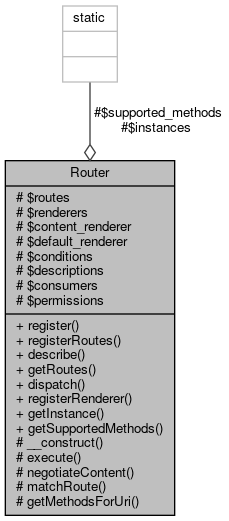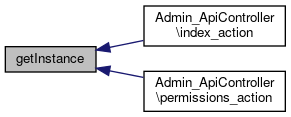Die Aufgabe des Routers ist das Anlegen und Auswerten eines Mappings von sogenannten Routen (Tupel aus HTTP-Methode und Pfad) auf Code.
Dazu werden zunächst Routen mittels der Funktion Router::registerRoutes registriert.
Wenn dann ein HTTP-Request eingeht, kann mithilfe von Router::dispatch und HTTP-Methode bzw. Pfad der zugehörige Code gefunden und ausgeführt werden. Der Router bildet aus dem Rückgabewert des Codes ein Response-Objekt, das er als Ergebnis zurück meldet.
$router->registerRoutes(
new ExampleRoute);
static getInstance($consumer_id=null)
Definition: Router.php:58
$router
Definition: bootstrap-api.php:16
$response
Definition: api.php:59
- Author
- Jan-Hendrik Willms tleil.nosp@m.ax+s.nosp@m.tudip.nosp@m.@gma.nosp@m.il.co.nosp@m.m
-
mlunz.nosp@m.ena@.nosp@m.uos.d.nosp@m.e @license GPL 2 or later
- See also
- Inspired by http://blog.sosedoff.com/2009/07/04/simpe-php-url-routing-controller/
- Since
- Stud.IP 3.0
◆ __construct()
| __construct |
( |
|
$consumer_id | ) |
|
|
protected |
Constructs the router.
- Parameters
-
| mixed | $consumer_id | the ID of the consumer this router should associate to |
◆ describe()
| describe |
( |
|
$uri_template, |
|
|
|
$description = null, |
|
|
|
$method = 'get' |
|
) |
| |
Describe one or more routes.
$router->describe(
'/foo',
'returns everything about foo',
'get');
'get' => 'returns everything about foo',
'put' => 'updates all of foo',
'delete' => 'empty up foo'
));
'/foo' => array(
'get' => 'returns everything about foo',
'put' => 'updates all of foo',
'delete' => 'empty up foo'),
'/bar' => array(...),
));
- Parameters
-
| String | Array | $uri_template | URI template to describe or pass an array to describe multiple routes. |
| String | null | $description | description of the route |
| String | $method | method to describe. |
- Returns
- Router returns instance of itself to allow chaining
◆ dispatch()
| dispatch |
( |
|
$uri = null, |
|
|
|
$method = null |
|
) |
| |
Dispatches an URI across the defined routes and produces a Response object which may then be send back (using output).
- Parameters
-
| mixed | $uri | URI to dispatch (defaults to ‘$_SERVER['PATH_INFO’]`) |
| String | $method | Request method (defaults to the method of the actual HTTP request or "GET") |
- Returns
- Response a Response object containing status, headers and body
- Exceptions
-
| RouterException | may throw such an exception if there is no matching route (404) or if there is one, but the consumer is not authorized to it (403) |
◆ execute()
| execute |
( |
|
$route, |
|
|
|
$parameters |
|
) |
| |
|
protected |
Takes a route and the parameters out of the requested path and executes the handler of the route.
- Parameters
-
| Array | $route | the matched route out of Router::matchRoute; an array with keys 'handler', 'conditions' and 'source' |
| Array | $parameters | the matched parameters out of Router::matchRoute; something like: ‘array('user_id’ => '23a21d...e78f')` |
- Returns
- Response the resulting Response object which is then polished in Router::dispatch
◆ getInstance()
| static getInstance |
( |
|
$consumer_id = null | ) |
|
|
static |
Returns (and if neccessary, initializes) a (cached) router object for an optional consumer id.
- Parameters
-
| mixed | $consumer_id | ID of the consumer (defaults to 'global') |
- Returns
- Router returns the Router instance associated to the consumer ID (or to the 'global' ID)
◆ getMethodsForUri()
Returns all methods the given uri responds to.
- Parameters
-
| String | $uri | the URI to match |
- Returns
- array of all of responding methods
◆ getRoutes()
| getRoutes |
( |
|
$describe = false, |
|
|
|
$check_access = true |
|
) |
| |
Get list of registered routes - optionally with their descriptions.
- Parameters
-
| bool | $describe | (optional) include descriptions, defaults to false |
| bool | $check_access | (optional) only show methods this router's consumer is authorized to, defaults to true |
- Returns
- Array list of registered routes
◆ getSupportedMethods()
| static getSupportedMethods |
( |
| ) |
|
|
static |
Returns a list of all supported methods.
- Returns
- array of methods as strings
◆ matchRoute()
| matchRoute |
( |
|
$uri, |
|
|
|
$method, |
|
|
|
$content_renderer |
|
) |
| |
|
protected |
Tries to match a route given a URI and a HTTP request method.
- Parameters
-
| String | $uri | the URI to match |
| String | $method | the HTTP request method to match |
| ContentRenderer | $content_renderer | the used ContentRenderer which is needed to remove a file extension |
- Returns
- Array an array containing the matched route and the found parameters
◆ negotiateContent()
Negotiate content using the registered content renderers. The first ContentRenderer that returns true when calling ContentRenderer::shouldRespondTo gets the job.
- Parameters
-
| String | $uri | the URI to which the content renderers may respond |
- Returns
- ContentRenderer either a ContentRenderer that responds to the URI or the default ContentRenderer of this router.
◆ register()
| register |
( |
|
$request_method, |
|
|
|
$uri_template, |
|
|
|
$handler, |
|
|
|
$conditions = [], |
|
|
|
$source = 'unknown' |
|
) |
| |
Registers a handler for a specific combination of request method and uri template.
- Parameters
-
| String | $request_method | expected HTTP request method |
| String | $uri_template | expected URI template, for example: |
| Array | $handler | request handler array: array($object, "methodName")
|
| Array | $conditions | (optional) an associative array using the name of parameters as keys and regexps as value |
| string | $source | (optional) this denotes the origin of a route. Usually either 'core' or 'plugin', but defaults to 'unknown'. |
- Returns
- Router returns itself to allow chaining
- Exceptions
-
| Exception | if passed HTTP request method is not supported |
◆ registerRenderer()
| registerRenderer |
( |
|
$renderer, |
|
|
|
$is_default = false |
|
) |
| |
Registers a content renderer.
- Parameters
-
| ContentRenderer | $renderer | instance of a content renderer |
| boolean | $is_default | (optional) set this renderer as default?; defaults to false |
- Returns
- Router returns itself to allow chaining
◆ registerRoutes()
Registers the routes defined in a RouteMap instance using docblock annotations (like @get) of its methods.
$router->registerRoutes(
new ExampleRouteMap());
- Parameters
-
- Returns
- Router returns itself to allow chaining
◆ $conditions
◆ $consumers
◆ $content_renderer
| $content_renderer = false |
|
protected |
◆ $default_renderer
| $default_renderer = false |
|
protected |
◆ $descriptions
◆ $instances
◆ $permissions
◆ $renderers
◆ $routes
◆ $supported_methods
Initial value:= [
'get', 'post', 'put', 'delete', 'patch', 'options', 'head'
]
The documentation for this class was generated from the following file:



